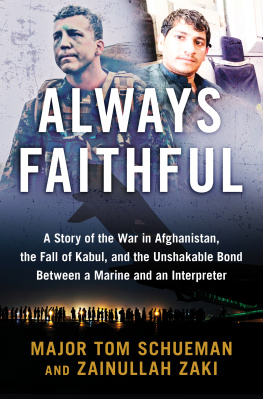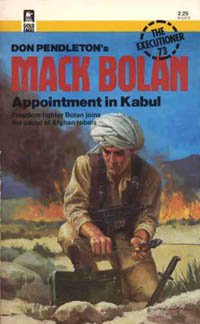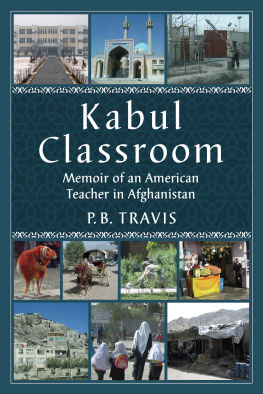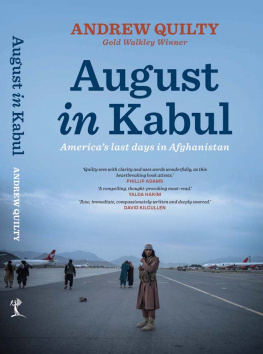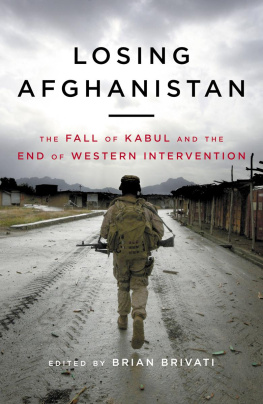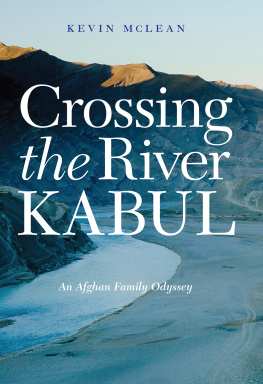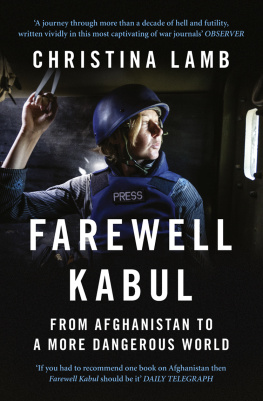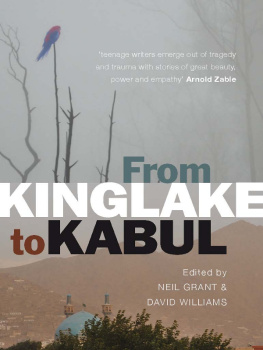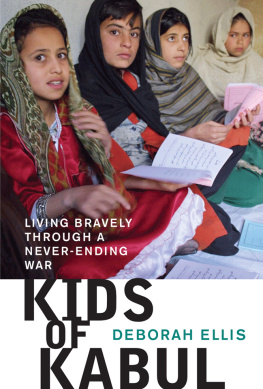Countdown: Spring 2020
ZAK
I STILL DREAMT of Sangin in those days. Id see bullets dancing across the surface of an irrigation canal as Marines hugged the side to escape them. Id smell ammonia and smoke and hear the screams of a wounded man. And then, Id wake suddenly to find my wife in bed next to me and our children asleep in our home.
It was 2:34 A.M. on a Tuesday when I traded the machine gun fire in my dreams for the insistent tones of my cell phone. Awaking from a Sangin dream was like surfacing from deep water and suddenly reaching air, my heart would race, my breaths would come as if torn from my lungs. I needed time to remind myself where I was, to center myself in the rhythms of my wifes gentle breaths, in the sounds my children make in their sleep. But on this night, as the phone rang, I was confused, still half asleep, as I looked at the number on the screen. I did not recognize it, but given the hour, I assumed it was an emergency, Salaam Aleikum.
The voice on the other end was hoarse. Is this Zainullah?
Bale.
We are coming for you, infidel. Your American masters are running from Afghanistan. Turn yourself in and beg for mercy or the Taliban will take your hea
I pushed END on the phone before he could say more. The room holding my family suddenly seemed to close in on me. My stomach felt as if it were being squeezed by a fist. There would be no more sleep that night. I checked each of my children. Deewa, my wife, stirred and was still. I got up to make sure the gate of our home was locked. I turned at the door to look at my wife and children, sleeping peacefully. They did not know what I knew. If I could help it, they never would.
The moonlight illuminated the mountains as I stepped upon the terrace of our home. The stones cold under my feet, I turned my eyes to the stars shining back at me, so beautiful and so uncaring. I checked the gate, again, and was relieved to see it still locked. My family was safe for the moment, but I wondered how much time we had left.
This wasnt the first such call I had gottenit wouldnt be the last. It had been ten years since I answered the call of my nation and went to help the Americans as a translator in Sangin District of Helmand Province. I spent months at war alongside American Marines and the Afghan National Army. We walked mile after mile in a place where the ground itself seemed to be trying to reach up to drag us down with claws of flame and steel. After decades of war, I had wanted to help build an Afghanistan where we could have the things the Americans talked about: freedom, democracy, and security. I wanted our country to guarantee basic human rights for our citizens. I wanted my daughters to go to school with my son and have a say in their own future.
Since 2016 though, it had been clear my dreams for Afghanistan were only that. I had decided back then, that if I could not raise my children in a safe, free Afghanistan where they could choose their own paths in life, I would apply for the Special Immigrant Visa (SIV) offered to battlefield translators and Afghans who worked directly for the United States government. I had wanted to build a life in my country, but if that was impossible, we would seek our dreams in America as so many have done. I began the SIV process in 2016, but when the bureaucracy proved too much for me alone, I reached out to Major Tom Schueman, the man who led the Marines I worked with in Sangin, in hopes he could help. He immediately went to work to help me. But by 2020, even with both of us, the system was still too complicated.
Making things worse, time was running out for me and my family. In February 2020, the Americans and the Taliban signed a deal in Doha, Qatar, that would have all Americans gone from Afghanistan by May 2021. I knew that I had attached my future and that of my family to the hopes the Americans brought in 2001, but those hopes would leave with them. The Americans were leaving for good, and I feared what lay ahead.
As a former interpreter, I had long known I was a target and I had accepted the risks. Other interpreters and members of the Afghan National Security Forces had already been killed by the Taliban, who posted Night Letters in public places threatening death to people who worked with the Americans or the Afghan government. Sometimes they named names. Sometimes they were left on a specific persons doorstep or taped to their door. The phone calls threatening me had started back in 2018. Now, standing in the courtyard of my familys home in the early hours of a morning in spring 2020, I could still hear the hoarse voice and the threat it had delivered only moments before.
As I turned my eyes back to the stars, my phone, still silenced to allow my family to sleep, buzzed in my hand. I looked down. A text message had arrived.
You cannot escape us, Zainullah. The justice of Allah will be swift. Your day is coming.
TOM
AS WITH MOST things in the United States Marine Corps, there is a cadence to the ceremonies by which we honor Marines who make the ultimate sacrifice. At a military funeral, the family and friends sit waiting before the open grave. From the rear of a hearse, a pallbearer detail in Marine dress blues draws forth a flag-draped casket. A Marine Staff Noncommissioned Officer calls out, Present arms! Uniformed service members snap a salute as the pallbearers carry a brother or sister to the grave feet first, the flag positioned such that the blue field of stars is at the head of the casket and over the left shoulder of the Marine within. A rifle firing details weapons, stacked at the front right side of the gathering, await the Marines serving as pallbearers, or body bearers in the blunt nomenclature of the Corps. A bugler stands opposite. Silence lays heavy upon the shoulders of the living as the pallbearers quietly execute the commands required to place the casket upon the carriage in front of the grieving family. On a muted command, the pallbearers execute facing movements and march forth, merging into a single column as they retrieve their rifles and stand at parade rest for the duration of the service.
The conduct of the service varies by religion and individual family desires, but at the conclusion, the senior member of the funeral detail moves to the head of the casket for a final hand salute. He or she is joined by every uniformed member present as the rifle detail, seven Marines strong, fires three times for a total of twenty-one shots before moving the rifles to a position known as present arms, a salute with a rifle. Marines in the crowd try not to flinch at the rifle fire. Their success often varies by the regularity and severity of their exposure to enemy fire. The bugler plays Taps as the echoes of rifle shots fade in the distance.
As the haunting, lonely, notes of the bugle fade into silence, the rifle firing detail stacks their weapons again and, in two ranks, marches back to the casket to fold the flag covering it. The senior member slowly lowers his salute. Marines and other servicemembers in the crowd follow suit, often accompanied by Marines now civilians. The salute seems discordant from men with long hair and beards, years of civilian life often gathered around their middles. But even with service sometimes decades past, the impulse to render honors is simply too deeply ingrained for men and women reborn as United States Marines at Parris Island, South Carolina; San Diego, California; and Quantico, Virginia.
Once the flag is folded, the senior pallbearer executes a right face and places it into the hands of the Marine designated to present it to the family. The movements take place in slow motion, a nod to the solemnity of the ceremony. The Marine carries the flag to the recipient, often a wife or mother, and says, Maam, this flag is presented on behalf of a grateful nation as an expression of appreciation for the honorable and faithful service rendered by your loved one. Taking a moment to try and comfort someone often far beyond it, he or she returns to the head of the casket. It is that sameness, the predictability of the ceremony, that allows Marines to deal with the drumbeat consistency of funerals during wartime. It is that same predictability that is so shocking to the senses when those wartime experiences pull Marines long at peace into the darkness years later.

